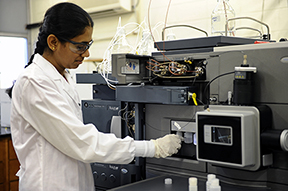 Plastics are part of everyday life. But throwing plastic away creates environmental problems. A North Dakota State University graduate student is developing a plastic that can be turned back into its original molecules and made into other products.
Plastics are part of everyday life. But throwing plastic away creates environmental problems. A North Dakota State University graduate student is developing a plastic that can be turned back into its original molecules and made into other products.
NDSU doctoral student Ramya Raghunathan has been invited to present her research at the prestigious Gordon Research Seminar on Photochemistry to be held July 18-19, 2015 at Stonehill College, Easton, Massachusetts.
Raghunathan’s presentation titled “A Sustainable Approach: Employing Light for the Degradation of Polymer/Oligomer Derived from Renewable Resources” is scheduled for Sunday, July 19, at 10:25 a.m. ET.
The conference includes graduate students, post docs and scientists from around the world. According to the conference website, the meeting bridges “fundamental photochemical research with applications of photochemistry in energy conversion and sustainability.”
Raghunathan, a doctoral graduate research assistant at NDSU, is part of a research team that received global attention for a proof-of-concept discovery last year.
“We have made polymer from biomass incorporated with a light absorbing unit. So when it is exposed to light, it breaks down to its building block (monomer),” said Raghunathan. “Ordinary sunlight cannot degrade this polymer, but when we use a special ultraviolet light at the nanometer scale, it can be degraded completely,” she explained. “We also have showcased that we can re-make the polymer from the recovered building block, thus addressing the challenge of degradation and recycling.”
Some may view the process created by NDSU researchers as the ultimate recycling, developing biodegradable plastics from biomass. In their proof-of-concept experiment, researchers used fructose from fruit, and have also worked with lignin and cellulose. The work was published in Angewandte Chemie, a leading international journal.
“This research has the potential to be developed into materials from renewable bio-resources, which can be degraded and reused, thereby reducing unwanted chemicals in the environment,” said Raghunathan, a native of Chennai, India.
This type of new plastic might hold particular promise when it comes to recycling or avoiding the graveyards of plastic from obsolete electronic equipment generated worldwide.
Raghunathan is part of a group that includes researchers from the NDSU Department of Chemistry and Biochemistry: Mukund Sibi, university distinguished professor; Jayaraman Sivaguru, James A. Meier professor; postdoctoral fellow Saravana Rajendran; postdoctoral fellow Retheesh Krishnan; and staff scientist Angel Ugrinov; as well as Dean Webster, professor and chair of the Department of Coatings and Polymeric Materials and postdoctoral fellow Ivan Hevus.
Raghunathan obtained her bachelor’s degree from S.D.N.B. Vaishnav College for Women, and master’s degree from Madras Christian College, Chennai, India, before coming to NDSU to pursue her doctorate degree.
The research is funded by NSF-ND EPSCoR grant IIA-1355466, with seed funding from ND-EPSCoR (EPS-0814442), as part of the Center for Sustainable Materials Science at NDSU.
About NDSU
NDSU, Fargo, North Dakota, USA, is notably listed among the top 108 U.S. public and private universities in the Carnegie Commission on Higher Education’s category of “Research Universities/Very High Research Activity.” As a student-focused, land grant, research institution, NDSU is listed in the top 100 research universities in the U.S. for R&D in agricultural sciences, chemistry, physical sciences, psychology, and social sciences, based on research expenditures reported to the National Science Foundation. www.ndsu.edu/research


